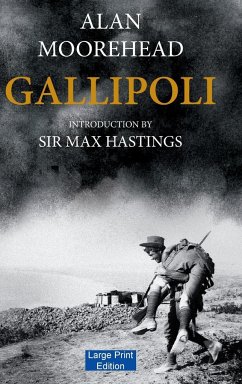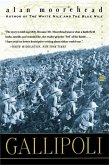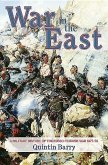The Gallipoli expedition was the bold and audacious plan of Winston Churchill, amongst others, to force the Dardanelles narrows, by sea and by land, to capture Constantinople from the Turks and to open the Black Sea to ships taking supplies and arms for the Russians on their immense German front. The campaign failed with catastrophic loss of life on all sides, but again and again, unbeknown to the Allies, they came close to achieving a goal that might have led to victory overall. This book, first published in 1956, is still regarded as the best and definitive account of the campaign. It won the Sunday Times Best Book of the Year Award as well as the inaugural Duff Cooper prize when the winner could choose who would present the award. Appropriately enough, Moorehead chose Churchill to make the presentation because the book demonstrated that the faults were not in the conception of the plan. Indeed, long after Churchill had resigned in disgrace, a new fleet was being assembled to again attempt to force the Dardanelles in 1919, which was cancelled when the war ceased and the Armistice was signed. Seen in the new light that Moorehead revealed, the Gallipoli campaign was no longer regarded as a blunder or a reckless gamble; it was the most imaginative conception of the war, and its potentialities were almost beyond reckoning. Certainly in its strictly military aspect its influence was enormous. It was the greatest amphibious operation which mankind had known up till then, and it took place in circumstances in which nearly everything was experimental: in the use of submarines and aircraft, in the trial of modern naval guns against artillery on the shore, in the manoeuvre of landing armies in small boats on a hostile coast, in the use of radio, or the aerial bomb, the landmine, and many other novel devices. These things lead on through Dunkirk and the Mediterranean landings to the invasion of Normandy in the Second World War. In 1940 there was very little the Allied commanders could learn from the long struggle against the Kaiser's armies in the trenches in France. But Gallipoli was a mine of information about the complexities of the modern war of manoeuvre, of the combined operation by land and sea and sky; and the correction of the errors made then was the basis of the victory of 1945. "the story of one of the great military tragedies of the twentieth century, which no writer has described better than Alan Moorehead." Sir Max Hastings.








